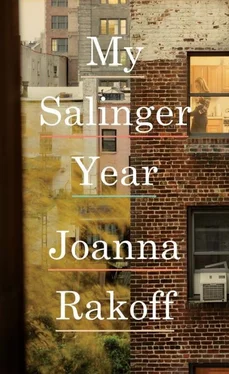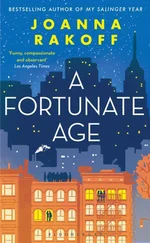“Typing is sort of a mindless task,” James opined, stretching his arms behind his head and hoisting his loafer-clad feet on his desk. “I spend so much time thinking . Or editing. Or, just, figuring out difficult things, so it’s nice to turn on the machine”—he gave it a friendly pat—“and type for a while. It relaxes me.” James sat up and smiled. He took himself, our work, so seriously. His smiles always took me by surprise. Hugh’s, too. “Still. It’s ridiculous that we don’t have computers.”
“You think?” I asked. This was the first I’d heard such an opinion expressed, and I was afraid that it was a trap.
“Um, yeah,” he said, laughing. “Don’t you?”
I did. Of course, I did. And yet I also, at that moment in time, didn’t know what I thought. About anything. I had an inkling—a vague suspicion that I was afraid to articulate even to myself—that this had something to do with work, with my boss. That in order to become part of something—and I did, desperately, want to be part of the Agency, more than I had wanted anything in ages, and without really understanding why—I had to relinquish some semblance of myself, my own volition and inclinations.
We’d moved in just a box or two before I realized why the apartment looked off-kilter, strange, wrong: the kitchen had no sink. How had we not noticed this when we looked at it? “I noticed it,” Don admitted. “But who cares? It’s five hundred dollars a month. We can wash the dishes in the bathtub.”
“I think we should ask the landlord to install a sink,” I said. “It’s just weird.”
“Why should the landlord install a sink?” Don scoffed, shaking his head at my naïveté. “He can find someone else to take the apartment without one. Like that.” He snapped his fingers for emphasis. “You can ask, but it’s not going to happen. And then the landlord is going to hate us.”
That night, a more pressing problem arose: we couldn’t figure out how to turn on the heat. There were vents in the floor, but nothing came out of them. In the hallway outside our front door we found a thermostat and turned it up, but nothing happened.
It was cold. Unusually cold for New York in January. And the walls of the little building appeared to lack any insulation at all. Inside, the air was as cold as out. I put on my warmest pajamas, a heavy sweater, piled blankets on the bed, but I still froze.
“I’ll turn on the oven and open the door,” said Don.
“Is that safe?” I asked. “What if the pilot blows out? Couldn’t we be gassed?”
Don shrugged. “It’s fine. This apartment is so drafty. There’s plenty of ventilation even if the windows are closed.”
“Okay,” I agreed, nervously. The next morning, we were still alive and the apartment was warm: it was so small that the oven could heat it entirely. As soon as I got to work, I called the realtor, who said he’d call the landlord. Her name, he told me, was Kristina. “She’s a real character,” he said.
That night, I arrived home to find Don talking to a squat woman with a platinum-blond bouffant and an excess of tanned flesh spilling out of a red tank top. “Hello,” she said in a thick Polish accent. “You are the wife. I am Kristina. I am very happy to meet you. Very happy to have such a nice couple, a nice professional couple, in this apartment. You met the man downstairs?”
“Um, no,” I said, taking off my coat. Don still had the oven on and the apartment was quite warm. Had he left it on all day? While we weren’t here?
“He is Mexican. Nice man, but he drinks. Mexicans, they work hard, but they drink. Poles, they don’t work hard, and they drink. The man upstairs, he is Polish, but he’s okay. Old.” Her eyes narrowed and her jaw began to protrude in an expression of distaste. “The man who lived in this apartment before you? He destroyed it. Holes in the walls. Gah.” She pursed her lips, her jowls doubling into themselves, and shook her head in disgust. Suddenly she turned to Don, who was sitting at his desk, wearing his glasses—round, wire-rimmed—in a plaid shirt and jeans. My jeans, actually. We were about the same size. “You are Jewish?” she asked him, though it came out more as a statement than a question.
“Me?” he said, smiling. “No. I’m not Jewish.”
“Of course you are!” she cried, throwing up her bare arms. “Look at you.” She turned to me with a conspiratorial smile. “He thinks because I’m Polish I don’t like Jews. But I do. I love Jews. Jews are good tenants. Pay the rent on time. Quiet. Reading books.” She gestured to Don’s desk, which was indeed littered with serious-looking tomes. “Jews are best tenants, yes?” She turned to me again and smiled, as if I, too, were a slumlord with fiercely held opinions on such matters. I smiled back. “He is Jewish, yes?”
“ She’s Jewish,” said Don, laughing, waving his hand in my direction. Oh my God , I thought. Really?
“ She?” Kristina scrunched up her face in contemplation. “No. Look at her. She’s so beautiful.” She gave Don a stern look. “You play joke. Stop.”
“So, we were wondering how to turn on the heat in here,” I interjected, before this line of discussion could go any further. “We noticed that there’s a thermostat in the hallway, but turning it up didn’t seem to have any effect.”
Kristina was shaking her head vehemently. “That is from when this was one-family house. It does not work now. We disconnect.”
“Oh, great,” I said. I was still standing by the door, unsure if I should sit down. “So how do we turn on the heat?”
Kristina’s blond head began shaking again, even more frenetically. “Heat? What you need heat for? It small apartment. It’s warm in here. Hot .” She gestured to the round folds of her body. “Look at what I am wearing. And I’m hot. No heat. You don’t need heat.”
Don began laughing nervously. “Right, that’s because the oven’s on. We couldn’t figure out how to turn on the heat, so we turned on the oven and opened the door.”
Kristina’s eyes narrowed in her fleshy face. She crossed her arms over her bosom and sighed, pursing her lips again into a forbidding line. We were no longer her friends, no longer her dream tenants.
“I’m gonna check for you. But what you need heat for?” She smiled broadly. “You have oven. Oven is fine. Oven is same as heater.” She picked up a nylon track jacket, also red, with white stripes down the sleeves, slipped it on, and zipped it to her chin. “Jewish?” she said, looking at me and smiling. “You think I am stupid.”
Salinger hadn’t called since the day he’d requested the royalty statements—we still didn’t know why he wanted them; James and Hugh chalked it up to yet another of his eccentricities—but others began to call for him, just as my boss had told me they would.
Some of the callers were simply old—Salinger’s peers—and perhaps didn’t understand the extent of Salinger’s self-enforced isolation from the world. When last they’d checked, he’d been a tortured young writer, on the cover of Time magazine, the future of American literature writ large. These callers felt an enormous kinship with Salinger, for they, too, had served during World War II, or grown up on the Upper West Side in the 1930s. Often, they had a personal matter to discuss with Salinger: They thought a character in one of his stories was based on their cousin. Or they thought their cousin had done basic training with Salinger. Or they’d lived down the street from him in Westport in 1950. Now, at the dawn of their dotages, they wanted to be in touch with this man whose work had been so significant to them in their youth. Or they’d reread Catcher and only now realized the extent to which it was about Salinger’s experiences during the war. Or they’d just turned back to “A Perfect Day for Bananafish” and found themselves sobbing with recognition, for they, too, had been suicidal after the Battle of the Bulge. No man should ever see what they saw.
Читать дальше












